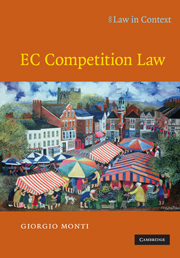Book contents
- Frontmatter
- Contents
- Preface
- Table of cases
- Table of legislation
- 1 Competition law: policy perspectives
- 2 The core values of EC competition law in flux
- 3 Economics and competition law
- 4 Competition law and public policy
- 5 Market power
- 6 Abuse of a dominant position: anticompetitive exclusion
- 7 Abuse of a dominant position: from competition policy to sector-specific regulation
- 8 Merger policy
- 9 Oligopoly markets
- 10 Distribution agreements
- 11 Institutions: who enforces competition law?
- 12 Competition law and liberalisation
- 13 Conclusions
- Index
5 - Market power
Published online by Cambridge University Press: 05 June 2012
- Frontmatter
- Contents
- Preface
- Table of cases
- Table of legislation
- 1 Competition law: policy perspectives
- 2 The core values of EC competition law in flux
- 3 Economics and competition law
- 4 Competition law and public policy
- 5 Market power
- 6 Abuse of a dominant position: anticompetitive exclusion
- 7 Abuse of a dominant position: from competition policy to sector-specific regulation
- 8 Merger policy
- 9 Oligopoly markets
- 10 Distribution agreements
- 11 Institutions: who enforces competition law?
- 12 Competition law and liberalisation
- 13 Conclusions
- Index
Summary
Four concepts of market power
At the heart of the EC's current economic approach to competition law is the view that market power offers a helpful preliminary filter to identify the sources of competition problems. However, the identification of market power is problematic because only firms in perfectly competitive markets are unable to raise price (because any price increase by one firm will lead to consumers switching to another competitor who sells at a lower price), but since perfect competition is a hypothetical model, it means all firms have some market power. This is why in the relatively competitive retail market for beer one brewer can comfortably advertise beer as ‘reassuringly expensive’ as a means of competing against others. Since the brief of a competition authority is not to create perfect competition but to deter certain forms of behaviour that harm economic welfare, only ‘significant’ manifestations of market power fall within the ambit of competition law. However, even with this qualification, the meaning of market power remains elusive.
There are four ways to think about market power. The first equates market power with the ability to increase price (the neoclassical approach), the second equates market power with commercial power, the third sees market power as the ability to exclude rivals so as to gain the power to increase price, and the fourth sees market power as a formal jurisdictional test.
- Type
- Chapter
- Information
- EC Competition Law , pp. 124 - 158Publisher: Cambridge University PressPrint publication year: 2007
- 2
- Cited by

